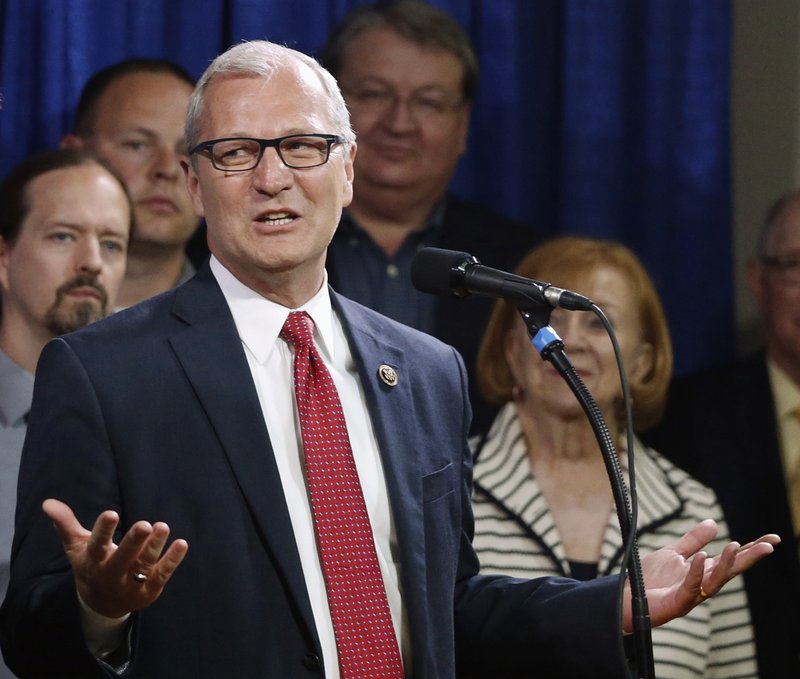BISMARCK, North Dakota -- Republican Rep. Kevin Cramer of North Dakota got a hard sell last week from President Donald Trump, who gave Cramer and his wife a personal tour of the West Wing and used the gilded luster of the newly renovated Oval Office to entreat Cramer to challenge popular Democratic Sen. Heidi Heitkamp.
It didn't work: Cramer turned down Trump, who had also called him about the race last fall.
It's the latest in a string of complications for Senate Republicans, who are clinging to a paper-thin majority and entering a midterm election year saddled with Trump's low approval ratings and a history of losses for the party in power.
"The president made a very patriotic case for me to run for the Senate seat, and told me he would be behind me 100 percent and campaign for me and with me," Cramer told The Associated Press.
But Cramer couldn't resist the pull of his family and of his position in Congress. "I don't want to be away every weekend, around the country and raising money when I have a 10-year-old at home and four grandchildren."
His decision came as Republicans in Ohio scrambled to find a replacement on the ballot for Josh Mandel, the favorite in the GOP Senate race who left the race Friday out of concern for his wife's health. Now the possibility looms of a primary race between four-term Rep. Jim Renacci and investor and author J. D. Vance, a contest that could leave the nominee hobbled.
Ohio and North Dakota are among the 10 states that Trump won in 2016 that have Democrats running for re-election. Republicans hold a 51-to-49 edge in the Senate, a margin narrowed last month by Alabama Democrat Doug Jones' surprise win over Republican Roy Moore a special election.
"I think everybody's eyes are wide open about the midterm," said Josh Holmes, a senior aide to Senate Majority Leader Mitch McConnell. "It is going to be extremely difficult to hold the House and the Senate, but we are doing everything we possibly can do to that."
Cramer's decision was the second time in recent weeks when Trump had been rebuffed in trying to woo a candidate to run for Senate.
The president urged Orrin Hatch of Utah to run for re-election, and the White House even scheduled a trip to Utah last year largely intended to woo the veteran senator, making sure that the 83-year-old had time alone with the president.
Yet Hatch recently announced plans to retire, paving the way for frequent Trump critic Mitt Romney, the 2012 GOP presidential nominee, to run for the seat.
In the meantime, Republicans, handed an opportunity to pick up a seat in Minnesota, were waiting for word from former Gov. Tim Pawlenty. The former governor, the most recent Republican to be elected statewide in Minnesota, is considered a top candidate for the seat Democrat Al Franken said he would give up last month amid allegations of sexual harassment.
Former Lt. Gov. Tina Smith, appointed to fill the seat until a special election in November, was sworn in last week.
In North Dakota, Cramer had been viewed as the lone Republican capable of mounting a strong challenge to Heitkamp, a former state attorney general and gas company executive seeking a second term.
Yet Cramer, 56, had put off a decision while the House pursued the tax overhaul, even as Heitkamp had more than $4 million for her re-election campaign.
Though Cramer never committed to running, White House officials and some McConnell advisers had believed he was leaning toward a bid.
Despite the complications, McConnell allies say Republicans' path to holding the majority is made less thorny by the fall of former Trump strategist Steve Bannon.
Bannon, whose political stock was damaged after backing Moore in Alabama, was sharply rebuked by Trump last week after being quoted in a tell-all book.
"It's still too early to cast judgment on the general election map," said Chris Pack, with the McConnell-affiliated super-PAC Senate Leadership Fund. "But the threat of Republican primaries from fringe candidates who can't win in November took a big blow with Steve Bannon imploding over the past couple of weeks."
State Desk on 01/12/2018